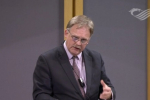
One of the presents my wife gave me last Christmas was a book telling the real story of a family entwined in the Second World War.
This included the following lines:
“Like many returning service personnel, he struggled for years with disabilities and other repercussions that went unrecognised and untreated”.
“Instead, they were encouraged to pick up the reins of family life, get a job, forget the past and look to the future.”
“Even more debilitating than the constant physical pain were the nightmares, reliving the torment and terrors so vividly that he would shout and throw up his arms in an effort to defend himself, and awake screaming and flailing in terror.
“But there was no recognition or treatment then for such mental scars”.
“Post-Traumatic Stress Disorder – PTSD - became officially recognised in 1992, too late for many.”
I grew up amongst that stoic generation.
They were our School Teachers and Shop keepers, local business people and local service providers, family friends and family members.
At least they had the unspoken support and understanding of people in their local communities, most of whom had also experienced war in some way.
This was not the case for the generations which followed.
Our motion today therefore calls on this Welsh Parliament to recognise the service and sacrifice of people from Wales in the UK Armed Forces and to express gratitude to current and former Armed Forces personnel for their contribution to Welsh society.
The Armed Forces Covenant refers to the mutual obligations between the UK Nations and our Armed Forces.
I led a short debate here in January 2008 supporting the Royal British Legion’s “Honour the Covenant” Campaign, concluding that this must be fought until it is won– and welcomed the publication of the Armed Forces Covenant in May 2011, introducing a statutory duty from 2012 to lay before UK Parliament an annual report which considers the effects of service on Regulars and Reservists, veterans, their families and the bereaved – and to also examine areas of potential disadvantage and the need for special provision where appropriate.
The Welsh Government and all Local Authorities in Wales signed the Covenant and subscribed to work with partner organisations to uphold its principles.
However, although all 22 Local Authorities have in place an Armed Forces Community Covenant, requiring them to have elected Member Armed Forces Champions, more is needed.
Despite the stated commitment of local authorities and the Welsh NHS to deliver as many tailored services as they can to the Armed Forces, my casework - and no doubt that of other Members - provides evidence that this does not go far enough.
Speaking here in December 2017, I stated “the UK Government's 2017 response to the Defence Select Committee report, which followed the 2016 armed forces Covenant annual report, commented on progress in Wales.
“In spite of this, however, there has not yet been an independent review of progress and delivery across Wales since the establishment of the Covenant”.
Speaking here in November 2018, again, I noted that there had not been an independent review of progress and delivery across the whole of Wales since the Covenant was established.
Hence our motion today calls on this Welsh Parliament to state that the Welsh Government’s Armed Forces Covenant annual reports should be considered by an appropriate Senedd Committee, to ensure that Ex-forces personnel and their families in Wales are being properly supported.
I first led a debate here calling on the Welsh Government to establish an Armed Forces Commissioner 8 years ago.
Speaking here in the November 2017 Welsh Conservative Debate on the Assembly Cross Party Group on the Armed Forces and Cadets' Inquiry into the impact of the Armed Forces Covenant in Wales, I called for the Welsh Government to consider the report’s 23 recommendations to improve support.
As I stated “the Inquiry found that in order to uphold the Covenant, the Welsh Government should consider the appointment of an Armed Forces Commissioner for Wales to improve the accountability of public sector organisations for the delivery of the Armed Forces Covenant” – adding:
“A Commissioner would support the specific needs of veterans, represent these to Welsh Government – and properly scrutinise service delivery for veterans carried out by Welsh Government, NHS Wales and local authorities. As with the other recommendations in this report, this role has been supported and endorsed by the Armed Forces community and Armed Services Heads.”
When I raised this again here the following year, the Welsh Government told me that this would “divert resources from practical services and support”.
Speaking here last November, I therefore welcomed the announcement in the UK Autumn Budget of “The establishment of a Veterans Commissioner for Wales, who will work to improve the lives and opportunities of the Welsh veterans’ community, recognising their contribution to UK Armed Forces”.
I was then delighted to welcome the UK Government appointment of Colonel James Phillips as the first Veterans’ Commissioner for Wales on St David’s Day this year.
Colonel Phillips, who is married and lives in Pembrokeshire with 4 children and a boisterous Welsh Springer Spaniel, has just completed his own transition to civilian life after 33 years in the Army.
He has served in Germany, Cyprus, The Netherlands, Northern Ireland, the Balkans, Afghanistan and Iraq – and has commanded soldiers, sailors and air personnel and worked in NATO, MOD, Joint and Army Headquarters.
On his appointment, he said:
“The ex-forces community forms an important part of Welsh society and there is a long tradition of service and sacrifice.”
“I will utilise my experience and position to improve the lives of all veterans and their families.”
Colonel Phillips will report directly to the Secretary of State for Wales, the Chancellor of the Duchy of Lancaster and the UK Minister for Defence, People and Veterans.
As the Secretary of State for Wales said “the Armed Forces have a long and important tradition in Wales and we are exceptionally proud of our Welsh veterans. Our ex-servicemen and women and their families deserve recognition, support and respect throughout the duration of their service and beyond.
“The appointment of a Veterans’ Commissioner for Wales will increase and coordinate the support available and highlights the UK Government’s commitment to the welfare of the men and women who serve in our Armed Forces.”
I stated “this new role will help ensure that no veteran will be left without appropriate support, and we wish Colonel Phillips all the best in his new job and look forward to working with him” – adding:
“It is vital that Labour Welsh Government Ministers work hand-in-hand with the Commissioner as many of the services our Armed Forces community rely on are devolved to Wales.”
I was therefore also pleased to read the statement by the Welsh Government Deputy Minister for Social Partnership, Hannah Blythyn, that:
“Wales provides a wide range of support for veterans … and we are committed to working with stakeholders to supporting all those who have served.
“The Veterans’ Commissioner for Wales is a UK Government appointment. We look forward to working with Colonel James Phillips as part of our commitment to veterans across Wales.”
I therefore hope that the Welsh Government will support our motion today, which also asks this Welsh Parliament to “welcome the appointment of Colonel James Phillips as the first Veterans’ Commissioner for Wales” and to “call on the Welsh Government to work with the Veterans’ Commissioner and the UK Government to ensure that the Armed Forces Covenant is upheld in Wales.”.
The Welsh Government’s Covenant annual report for 2020 described two main achievements:
- an increased funding provision for Veterans NHS Wales, which enables veterans with mental health issues to receive appropriate support.
- AND Funding the Armed Forces Liaison Officers until 2023 to embed Covenant guidelines in Local Authorities across Wales.
Although the Armed Forces Expert Group welcomed the report, it submitted 8 key priorities for the Welsh Government to address in this Senedd term, including:
- Developing a national plan to implement changes from the Armed Forces Act
- Committing to permanently fund the supporting service children in education Wales fund and
- AND extending housing priority to cover 5 years post leaving military service.
The Veteran’s Commissioner can play a key role in areas such as these.
It is almost 17 years since I first raised the need for traumatised ex-forces personnel to access mental health care and receive priority treatment.
The Welsh Government did eventually launch Veterans NHS Wales, providing Veterans living in Wales with non-residential assessment and psychological treatment for mental health problems, including PTSD.
As Veterans NHS Wales told me, last November, they were grateful for their funding increase this financial year to keep the staff employed that Help for Heroes funded for 3 years.
They added, however, there were several other funding requests in their Business case which Welsh Government failed to fund, including NHS employed Peer Mentors and increased Psychiatrist sessions, currently only one day per month.
The Veteran’s Commissioner can therefore also play a role on issues such as these.
